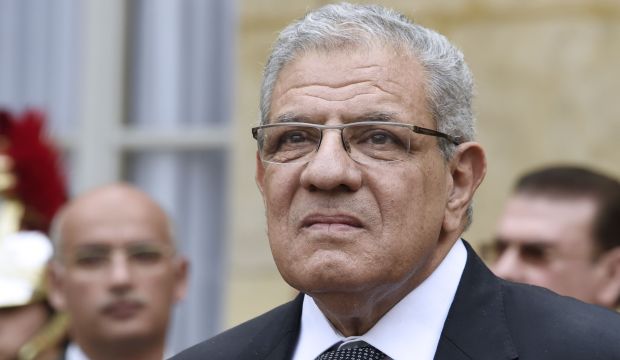
Egyptian Prime Minister Ibrahim Mahlab arrives for a meeting with his French counterpart at the prime minister’s office in Paris on May 13, 2015. (AFP/Dominique Faget)
Paris, Asharq Al-Awsat—Egyptian Prime Minister Ibrahim Mahlab has said that his country’s security forces are making progress toward eradicating terrorism in Egypt, but added that there is still work to do.
In an interview with Asharq Al-Awsat on the sidelines of a state visit to Paris, the Egyptian Prime Minister said: “It will take time [to completely eradicate terrorism]. There is terrorism in the Sinai Peninsula and President Sisi announced that 80 percent of the tunnels [at the Sinai border town of Rafah] have been destroyed. All that is left is individual terrorist action, such as placing a bomb here or there, and it is difficult to set a date for when that will be over.”
Speaking during a televised address on Tuesday, Egyptian President Abdel-Fattah El-Sisi announced that security forces had arrested 600 terrorists across the country in April, including the arrests of 188 terrorists in Sinai and the destruction of 150 “terrorist hotbeds.”
“These numbers reflect the efforts we exert and the magnitude of the challenges we face,” Sisi said.
Prime Minister Mahlab said that Egypt is seeking to confront terrorism through more than just security measures, particularly by improving economic and social conditions in the country.
“It will require increased development to get rid of this form of terrorism, because security confrontation is not the only means through which to confront terrorism. Development is very important, as well as pursuing ideological reform, and we are working on all axes, including support of development and providing job opportunities for our youth,” Mahlab said.
“The raw material for terrorism is despair, ignorance and injustice and we are working to connect with civil society,” he added.
On the deteriorating security situation in neighboring Libya, which is having a knock-on effect on Egypt’s security, Mahlab said: “The only way out is through commitment to legitimacy. In Libya, two major issues are raising international concern: First, illegal immigration is of grave concern to Europe. Second, are the latest developments on the ground inside the country.”
“The solution in Libya cannot come at the expense of legitimacy. There are two governments: a legitimate government in Tobruk . . . and an illegitimate government [in Tripoli]. You cannot communicate with an illegitimate government; You should only communicate with the legitimate government. Our view is to commit to and uphold legitimacy and Libyan territorial integrity,” he added.
As for criticism of UN envoy to Libya Bernadino Leon’s mediation, Mahlab cautioned for patience. “His mediation is not yet closed. We must be patient. We need to exhaust all political solutions. In any case, any move for military intervention in Libya will not be accepted unless it takes place under legitimate international cover and with the purpose of rebuilding the Libyan state,” Mahlab told Asharq Al-Awsat.
The prime minister also denied that there had been any recent change in Egyptian-Saudi relations, stressing that ties between Cairo and Riyadh are as strong as ever.
“Egyptian-Saudi relations have proved to be fateful and strategic. No Egyptian can forget the excellent assistance provided to Egypt by King Abdullah Bin Abdulaziz which King Salman is continuing today. Relations with our Saudi brothers are beyond excellent, and we consider the Saudi people to be part of the Egyptian people,” he said.
